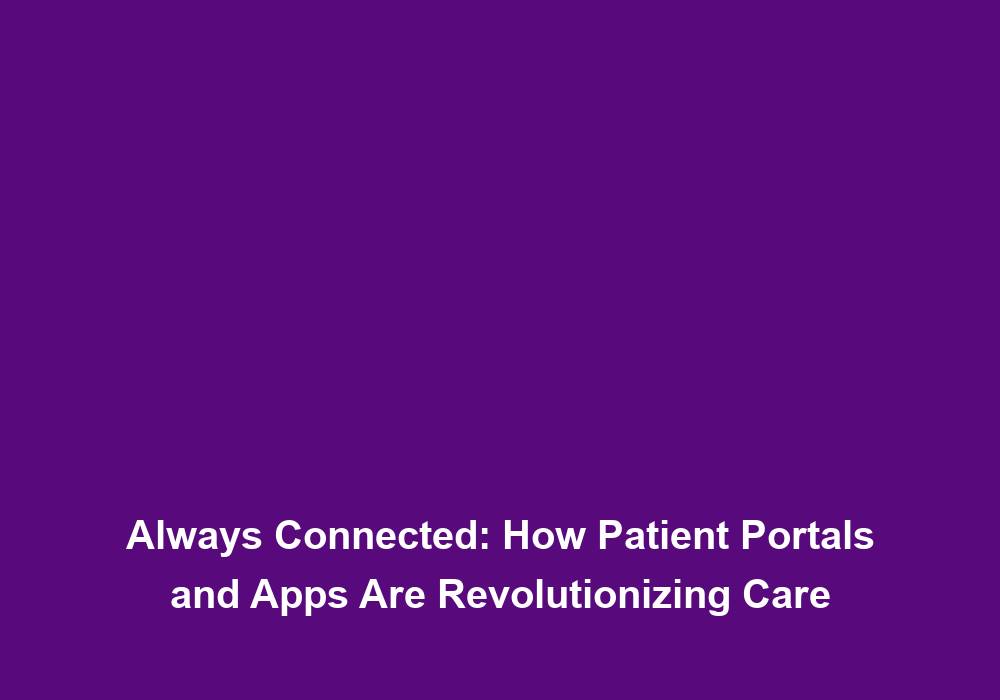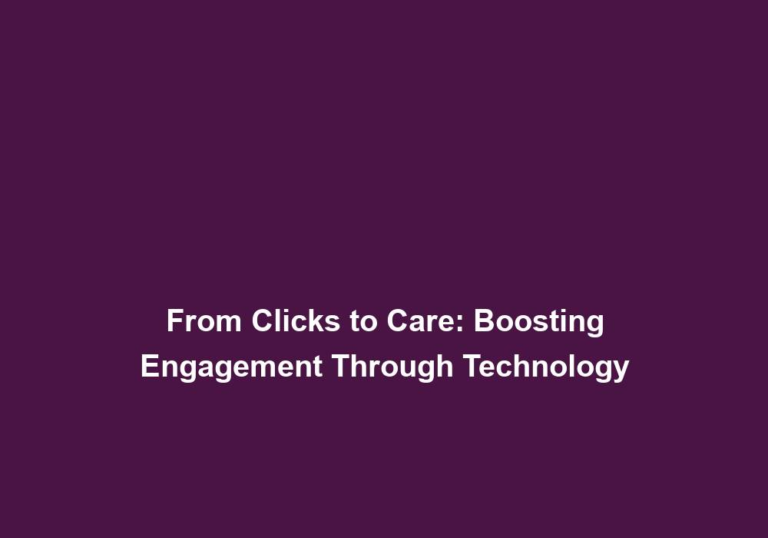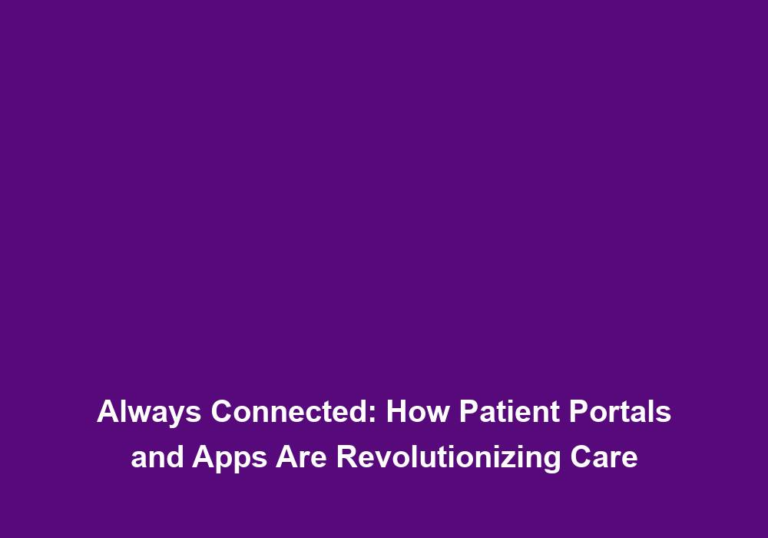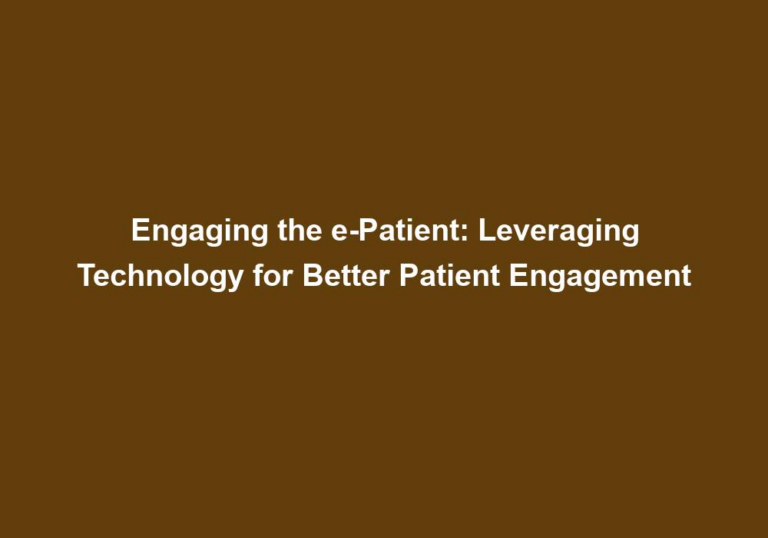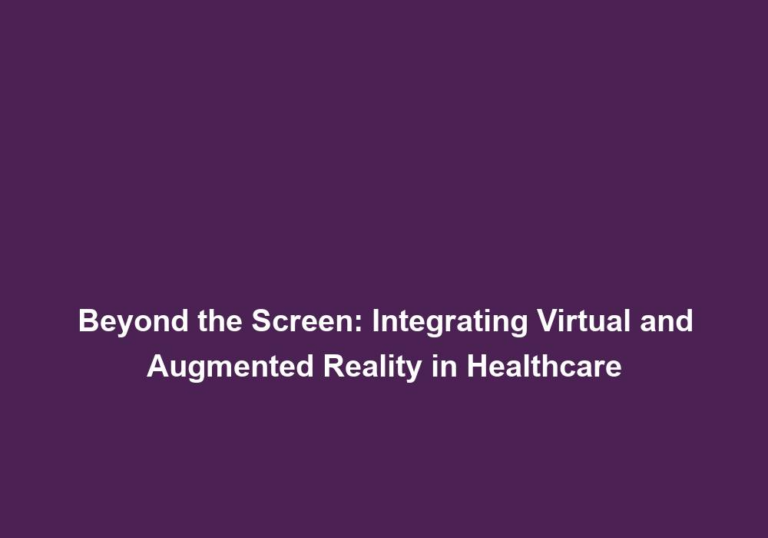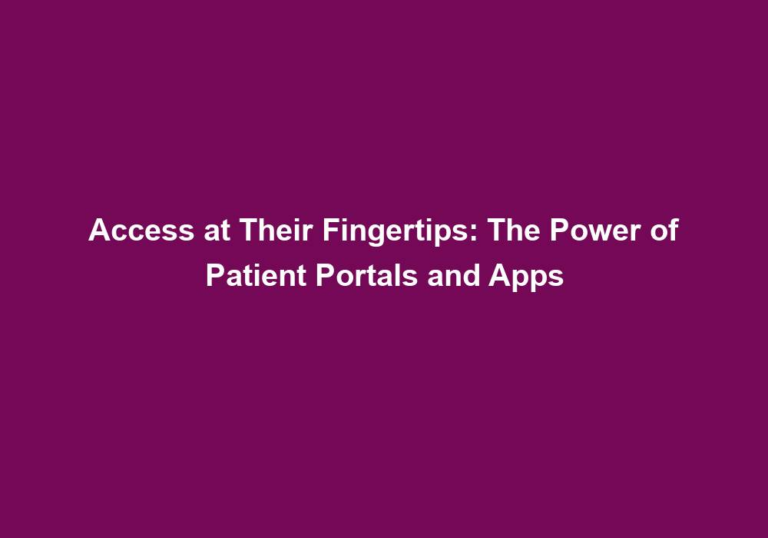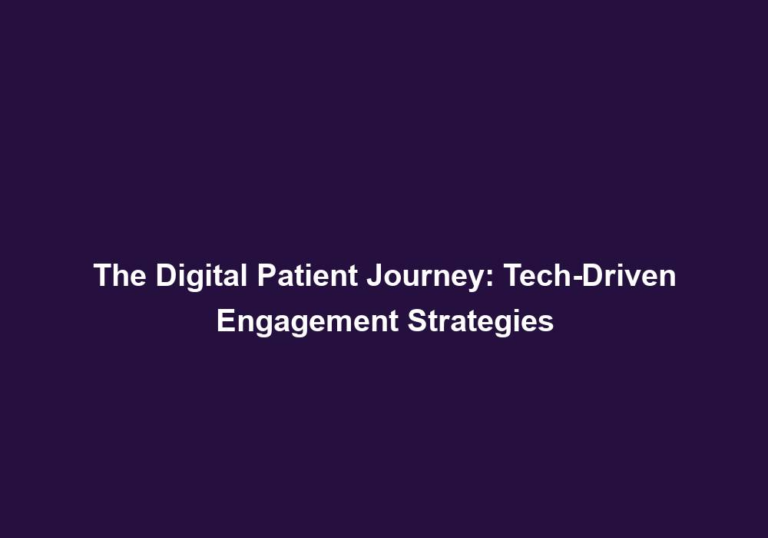Portals to Health: Maximizing the Use of Patient Portals and Apps
In today’s digital age, technology has permeated nearly every aspect of our lives, including healthcare. Patient portals and mobile apps have revolutionized how we interact with healthcare providers and manage our own health. These powerful tools empower patients to access their medical records, communicate with healthcare professionals, and take an active role in their own care. In this article, we will delve into the benefits and functionalities of patient portals and apps, and explore how they can be maximized to improve overall health outcomes.
What are Patient Portals and Apps?
A patient portal is a secure online platform that grants patients convenient access to a range of healthcare services and information. It acts as a gateway between patients and their healthcare providers, offering features such as appointment scheduling, prescription refill requests, lab results, messaging with healthcare providers, and access to educational resources. On the other hand, mobile apps designed for healthcare provide similar functionalities but are accessible via smartphones and tablets. These apps are specifically developed to cater to the needs of patients, offering a more user-friendly interface and additional features like medication reminders, fitness tracking, and symptom monitoring.
Benefits of Patient Portals and Apps
-
Convenient Access to Medical Records: Patient portals and apps enable individuals to view their medical records anytime, anywhere. This easy access to health information empowers patients to stay informed about their conditions, understand treatment plans, and make well-informed decisions about their health. With just a few clicks, patients can review test results, track their progress, and gain a comprehensive understanding of their medical history.
-
Efficient Communication: Patient portals provide a secure messaging platform that facilitates direct communication between patients and healthcare providers. This eliminates the need for lengthy phone calls or waiting for office visits to discuss non-urgent matters. Patients can conveniently communicate regarding questions, concerns, or updates, enhancing overall healthcare experience. The ability to message healthcare providers also promotes timely and effective communication, leading to better coordination of care.
-
Appointment Management: With patient portals and apps, individuals can schedule, reschedule, or cancel appointments with ease. This feature reduces wait times, improves scheduling efficiency, and ensures that patients receive timely care. Patients can view available appointment slots, select a time convenient for them, and receive automated reminders to help them stay organized and on top of their healthcare appointments.
-
Prescription Refills: Patient portals and apps often offer the functionality to request prescription refills online. This eliminates the need to call or visit a pharmacy, saving time and streamlining the process. Patients can simply log into the portal or app, select the medications they need, and submit a refill request. Healthcare providers can review and approve the request, making it more convenient for patients to manage their medications.
-
Lab Results and Records: Patients can access their lab results and medical records through patient portals and apps. This empowers individuals to track their health progress, compare results over time, and have a comprehensive overview of their medical history. The ability to access lab results online allows patients to be proactive in managing their health and discussing any concerns or abnormalities with their healthcare providers.
-
Educational Resources: Many patient portals and apps provide access to educational resources, such as articles, videos, and interactive tools. These resources help patients understand their conditions better, make lifestyle changes, and actively participate in their treatment plans. Patients can access reliable and up-to-date information about their health conditions, treatment options, preventive measures, and healthy lifestyle choices. This knowledge empowers patients to make informed decisions and take control of their health.
Maximizing the Use of Patient Portals and Apps
To fully benefit from patient portals and apps, it is essential to maximize their use and explore all available features. Here are some tips to help patients make the most of these digital healthcare tools:
1. Complete Registration and Profile Setup
During the initial registration process, ensure that all required information is provided accurately. Fill in personal details, emergency contact information, and insurance details if applicable. Updating and maintaining an up-to-date profile helps healthcare providers deliver personalized care and tailor services to your specific needs. By providing comprehensive and accurate information, patients can ensure that their healthcare providers have a complete understanding of their medical history and can make informed decisions about their care.
2. Familiarize Yourself with Available Features
Spend some time exploring the patient portal or app to understand the available features and functionalities. This may include appointment scheduling, messaging, prescription refill requests, access to medical records, and educational resources. Familiarization with the platform will allow you to navigate through it effortlessly and take advantage of all its benefits. Take the time to explore each feature and understand how it can support your healthcare journey.
3. Secure Messaging and Communication
Utilize the secure messaging feature to communicate with healthcare providers. It is an efficient way to address non-urgent concerns, seek clarifications, or update healthcare providers on your condition. However, keep in mind that in case of emergencies, it is always best to contact your healthcare provider directly or call emergency services. Secure messaging provides a convenient and reliable means of communication for non-emergency queries, ensuring that patients can stay connected with their healthcare team.
4. Track and Monitor Your Health
If the patient portal or app offers features such as fitness tracking, medication reminders, or symptom monitoring, take advantage of them. These tools help you stay on top of your health goals, manage chronic conditions effectively, and promote overall well-being. By tracking and monitoring your health, you can identify patterns, set achievable goals, and make informed decisions about your lifestyle and treatment plans. These features can provide valuable insights into your health and empower you to take proactive steps towards improving your well-being.
5. Stay Informed with Educational Resources
Make use of the educational resources provided by the patient portal or app. These resources can provide valuable information about your health conditions, treatment options, preventive measures, and healthy lifestyle choices. The more informed you are, the better equipped you will be to actively participate in your care. Take the time to explore the educational materials available, whether they are articles, videos, or interactive tools. This knowledge will empower you to make informed decisions about your health and engage in meaningful conversations with your healthcare providers.
6. Share Feedback and Suggestions
Patient portals and apps are continually evolving to meet the needs of users. If you have any feedback or suggestions regarding the platform’s usability or additional features you would find helpful, don’t hesitate to share them with your healthcare provider. Your input can contribute to the ongoing improvement and optimization of these digital tools. By providing feedback, you can help shape the future of these platforms and ensure that they continue to meet the needs of patients. Your suggestions may lead to enhancements that benefit not only you but also other individuals using the patient portal or app.
In conclusion, patient portals and apps have transformed the way patients engage with healthcare services. These powerful tools provide convenient access to medical records, facilitate efficient communication with healthcare providers, and offer a range of features to enhance overall healthcare experience. By maximizing the use of patient portals and apps, individuals can actively participate in their own care, stay informed about their health, and work towards achieving their wellness goals. Embrace these digital portals to health and unlock the full potential they offer in empowering you to lead a healthier life.
Note: The article is written in markdown format for easy readability and formatting purposes. Markdown syntax is designed to be converted into HTML for publishing on various platforms.

